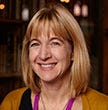Enriqueta Rylands: Philanthropist & founder of the John Rylands Library
Enriqueta Augustina Rylands (1843–1908) was the third wife of the wealthy Manchester Cotton manufacturer John Rylands. We know very little about how they met. Sometime in the 1860s she became a ‘ladies companion’ to Martha, John’s second wife, and joined the couple in their charitable activities. After Martha’s death Enriqueta married John on 6 October 1875 and remained with him until he died in 1888.
Who was Enriqueta Rylands
Enriqueta Augustus Rylands was born in Cuba, where her mother’s family owned a sugar plantation. She spent her childhood in Cuba, France, America and England. Enriqueta was a deeply private person and only a few facts about her life remain, but she was clearly an extraordinary woman. In 2008 the Library held a major exhibition, Enriqueta Rylands: Who do you think she was? Discovering the Founder of the John Rylands Library. The accompanying exhibition leaflet is here. Her life is subject of PhD currently undertaken by a member of the Special Collections Team and we are discovering much more about her role as a book collector and philanthropist.
She used the vast fortune she inherited to establish the John Rylands Library in his memory. It was the largest single act of Library philanthropy the country had seen. The Manchester Corporation recognised this extraordinary addition to the cultural wealth of Manchester when it granted Enriqueta Rylands the Freedom of the City.
This Freedom scroll was awarded to Enriqueta Rylands by the Corporation of Manchester in 1899. The decorative illumination is full of symbolism, from the Manchester worker bee to the lamp of enlightenment. The coat of arms created for Enriqueta Rylands in 1893 is to the left of the image of the Library.
Link to detailed catalogue description
Alongside the decorative scroll Enriqueta received a silver casket decorated with scenes from the Library.
In her short acceptance speech, Rylands focused on the relationship between the Library and the City — ‘in all its manifold activities and life’. She founded the Library in Manchester because of its association with her husband’s life. In doing so, she became part of her adopted city.
“when I use the word city, I use it in the widest sense, that is to say, as applying to the city in all its manifold activities and life … literary, and educational, mercantile, professional and industrial, and lastly, what I regard as first in importance, religion”
Silver casket, engraved with views of the John Rylands Library, Deansgate, Manchester. The casket was presented to Mrs Enriqueta Augustina Rylands in October 1899, along with a scroll bearing the Freedom of the City of Manchester. This view is of the back of the casket, which bears an illustration of the Reading Room which is different to the actual completed Reading Room. Why do you think that was so?
Silver Casket c. 1899 Link to digital surrogate in Luna
Newspaper cutting: Illustration of Enriqueta Augustina Rylands signing the roll of the Free Citizens of Manchester on the 6th October, 1899. Interestingly Enriqueta did not deliver her own ‘thank you’ speech instead her brother read aloud her words.
Enriqueta’s last will and testament specified that her personal papers should be destroyed after her death. Fortunately she requested that papers relating to the foundation of the Library were to be retained. From these we can catch glimpse of her. You can read the Last will & Testament of Enriqueta Rylands here
The Library was situated in Spinningfields, a slum district of Manchester.
Why did she build it there?
Enriqueta never explained why she chose this cramped site in the notorious slum area of Deansgate, away from Manchester’s existing museums and galleries. Perhaps she hoped to spark an improvement in a run-down area? Perhaps she thought the Library should stand amongst the warehouses which were the source of her wealth?
The Library building took over ten years to construct and cost £224,086. Enriqueta spared no expense in building the Library‘s collections, including the purchases of the Spencer library for £210,000 in 1892 and Crawford manuscripts in 1901 costing £155,000.
The Library building was inaugurated on 6th October 1899: Enriqueta’s 24th wedding anniversary. On the same day Enriqueta became the first woman to be awarded the honorary freedom of the City of Manchester an honour that was not given to another woman till the 1950s. When she died in 1908, she gave the Library an additional endowment of £200,000, by far the largest of her many charitable gifts.
Discussion Points
Was Enriqueta Rylands a typical woman of her time and class? If not, why not?
How significant was religion in her life?
What does a close reading of Enriqueta’s Last Will and Testament and her Acceptance Speech during the Freedom of the City ceremony tell us about Manchester’s nineteenth century civic culture
Additional Resources
Elizabeth Gow, Special Collections Manuscript Curator and Archivist, explores Enriqueta’s Cuban history in the two blogs below, including the family’s connection with slavery.
Riches of the Rylands : the Special Collections of the University of Manchester Library, University of Manchester. Library (2012)
Return to ‘Made in Manchester’ home page
Images reproduced with the permission of The John Rylands University Librarian and Director of the University of Manchester Library. All images used on this page are licenced via CC-BY-NC-SA, for further information about each image, please follow the link in the caption description.
